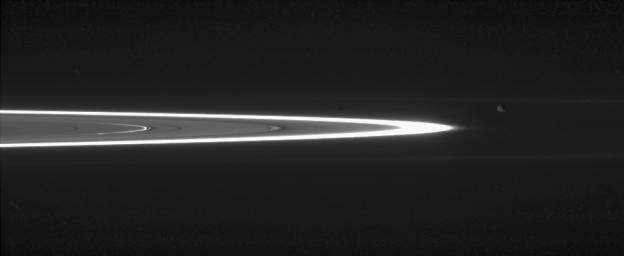Tiny, dust-sized particles in Saturn's rings become much easier to see at high phase angle -- the angle formed by the Sun, the rings and the spacecraft. The brightest ring is the F ring; the next feature to the left is the outer edge of the A ring. Inward of that, and very bright, are the ringlets in the Encke gap.
Epimetheus (116 kilometers, or 72 miles across) is easy to spot just right of the outer F ring edge. Janus (181 kilometers, or 113 miles across), however, is quite a bit harder to make out; it is the dark spot located directly to the left of Epimetheus, above the gap between the A and F rings.
Within the space between the A and F rings there are two faint rings seen previously by the Cassini spacecraft. The inner faint ring (called R/2004 S1) coincides with the orbit of Atlas. The outer one forms the inner boundary of the orbit of Prometheus.
The narrow G ring is visible above and below the bright F ring.
The image was taken in visible light with the Cassini spacecraft narrow-angle camera on July 15, 2006 at a distance of approximately 2.7 million kilometers (1.7 million miles) from Epimetheus and 2.8 million kilometers (1.7 million miles) from Janus. The view was acquired at a Sun-Epimetheus-spacecraft, or phase, angle of 164 degrees. Image scale is 16 kilometers (10 miles) per pixel.
The Cassini-Huygens mission is a cooperative project of NASA, the European Space Agency and the Italian Space Agency. The Jet Propulsion Laboratory, a division of the California Institute of Technology in Pasadena, manages the mission for NASA's Science Mission Directorate, Washington, D.C. The Cassini orbiter and its two onboard cameras were designed, developed and assembled at JPL. The imaging operations center is based at the Space Science Institute in Boulder, Colo.
For more information about the Cassini-Huygens mission visit http://saturn.jpl.nasa.gov/home/index.cfm. The Cassini imaging team homepage is at http://ciclops.org.

 Planetary Data System
Planetary Data System












